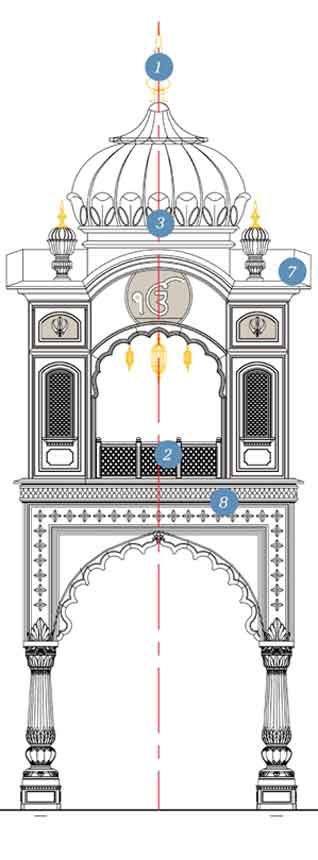Faith
Am I a Sikh? How Much?
Part I
HARBANS LAL
I cannot recall any one asking me the question, “Are you a Sikh?” either during my childhood in pre-Partition Punjab (an area which is now in Pakistan), or after the partition of Punjab and the sub-continent in 1947.
There were two exceptions, though.
The first being at the time of the census and the other at the time of school registration.
It never worried me either, as more than once I was honored by Sikh institutions and was elected to serve as a leader of Sikh organizations and institutions.
If someone did ask me if I was a Sikh, I found no hesitation in answering "yes" emphatically and unequivocally. The question was undemanding, the answer was easy, and the matter was swiftly concluded.
After I migrated to North America, however, the situation began to change. The frequency of grilling questions on the religious identification has generally increased in the past few years.
The questions are evolving into rhetorical debates. When the question is rhetoric, lengthy answers are expected. It’s a trap: definitive answers are taken as pretentious, down-to-earth answers are considered evasive.
Anything in-between carries the failings of both of these.
Such questions are no surprise to me. I am a stranger to many, and not visibly recognizable as a Sikh.
However, it’s still not a big deal for me.
To a simple question, I politely answer in affirmation that I am a Sikh.
If someone persists with additional questions, I further qualify myself as a Sehajdhari Sikh. The matter usually ends; except sometimes I may have to explain politely the meaning of the word ‘sehajdhari’ or the full significance of a ’sehajdhari Sikh’.
Sehajdhari Sikhs are those who adopted the Sikh religion, Sikhi, by choice, often without being born in a Sikh family. For all intents and purposes, they are devout Sikhs, professing the Sikh faith, observing Sikh ceremonies, and considering themselves as an integral part of Sikh society.
They may not conform to the five Ks, but believe in all institutions of Sikhism, including the Khalsa and khande di pahul. They have a long history of serving the community and its institutions since the time of the Gurus. Quite a large number of the Sikhs who live outside Indian Punjab, including many outside India, belong to this category.
The situation changes completely, however, when I ask myself the question, “How much of a Sikh am I?” and when the term ‘Sikh’ is used not a noun but an adjective or a verb. Then a probing of my own consciousness begins.
It is accompanied by a stomach-churning experience.
“Must it not be a lifelong probe and continuous prayer in humility?” I ask myself.
The question then becomes not so easy to answer; nor is the answer that straightforward.
SIKH: A NOUN, AN ADJECTIVE OR A VERB?
To avoid unpleasantries, clever linguists use plural for adjectives as well as nouns so that the distinction that I wish to make here is left to the subtlety and appreciation of the reader. This way the translator is unrestricted from choosing and selecting from his own imagination.
But really, there is a difference.
The noun ‘Sikh’ is stagnant, the adjective dynamic.
The noun is comforting, the adjective demanding.
The noun asserts, the adjective pleads.
The noun is worldly, the adjective spiritual.
That is why I raise so much fuss over the difference between “Sikh” and “a Sikh.” Certainly, it ceases to be a ‘yes-or-no’ matter; the question becomes, rather, "How much Sikh am I?"
I cannot be confident in laying claim to any degree, large or small, of Sikh-ness and say, “Oh, I am very Sikh, indeed.”
That answer is both arrogant, and untrue.
However, can I absolve myself by admitting that, alas, I am hardly Sikh at all?
This is cowardly and considered irresponsible even though it may make me aware of how little Sikh I really am.
Although discouraging, it gives me a powerful drive to strive to be more Sikh than I am.
DEFINITION
To me the most important Sikh belief or commitment that I am asked to carry is to live according to the teachings of our scripture, Guru Granth Sahib.
By the same belief, all other requirements to be Sikh become derivatives. They may be more important, however, when the term ‘Sikh’ is used as a noun.
Millions of Sikhs are endeavoring to follow the manifold teachings of our Eternal Shabad or the “Word” Guru, as enshrined in Guru Granth Sahib. It is a rude assumption to pick on one or the other beliefs / teachings to define someone; whether one is a practicing Sikh or not. That only causes misperception and unpleasantness.
If I am defined only by practicing all that our Eternal Guru asks of us, then I fall far short because I am still seeking, learning and endeavoring. Those who can practice all of the teachings are really blessed and I must look up to them as soon as I can spot them. Only with their support and at the feet of the Shabad Guru that I become aware of how little Sikh I really am!
This gives me a haunting but powerful sense that I ought to be more Sikh than I am.
DYNAMISM
As you can see, the answer to the question acquires a very dynamic quality.
Because Sikhi is perpetual learning, and the response varies from day to day.
The first of my two questions -- “Am I a Sikh?” -- needs to be answered usually once; a tick in the appropriate column of the Census report or the membership application of a local gurdwara, that carries over from one year to the next. Most of my friends do not change their formal "religion," and neither do I.
If someone asked me, "Are you a Sikh?" a decade ago, I should not expect him or her to repeat the question this year, unless my response was forgotten.
When the term Sikh is used as an adjective, "Am I Sikh?", it becomes more of a lifelong and life-style issue.
Perhaps yesterday morning, for a brief spell, I was indeed a fairly good Sikh in my starting of the day, with a deep sense of gratitude and thoughtful readings from Guru Granth Sahib. I followed it by treating my fellow drivers with courtesy as I zoomed to my work-place. At work I was diligent and honest.
But perhaps I was less of a Sikh in the evening when I yelled at the cleaning lady at the office, and overlooked being courteous to other drivers during the rush hour heading home.
How much Sikh was I yesterday when I saw a hungry homeless person standing in the heat of the Arizona sun and drove away in my air-conditioned car without stopping?
How much Sikh was I last year when I voted in the American elections on the issue of food stamps for the poor, rights of women, or banning the field mines?
Do you find that there are certain issues when you feel usually less Sikh in your dealings with other fellow humans? The issues are not only ethical: but in their depth, they are questions of how Sikh am I, doctrine-wise.
Was I truly Sikh as I spoke to the congregation last Sunday? Was the congregation truly Sikh when it formulated the election by-laws to exclude others? How Sikh are we as when we belt out a tirade against the religion of our neighbors, for example?
FOR SIKHS ONLY
A few years ago I was reading an article on ‘Gurdwaras‘. I came across a sentence saying that the gurdwara was a house of worship for the Sikhs. We read such assertions every day.
Does that mean that others aught not to worship, or share langar there? Should we then not recite in our gurdwara the following verse from Guru Granth, expressly addressed to a Muslim?
“Awake, O Farid, and cleanse yourself; then chant your morning Muslim prayer.” [GGS:1381]
Are we not shocked, first, at the arrogance of our co-religionists, and then, even more profoundly, at the self-righteousness of our excuses?
That sin of labelling a place of worship as ’for Sikhs’ is contradictory to the faith itself. Although at the level of being a Sikh, one may not think of it as unsettling, the illustration is pertinent to the present topic under discussion.
Theologically, no sensitive or decent Sikh could patronize that tender but it is done routinely done so by those counting themselves as Sikhs.
A gurdwara that excludes those who are not Sikhs, by the same act excludes those who are Sikh. Both Noun and adjective are shredded here while tearing them apart.
Guru Nanak says early on, in the commencing verses of the Guru Granth: aa-ee panthi suggal jamaati - “the best religious path is the one that welcomes all voyagers.”
Continued tomorrow ...
[Courtesy The Sikh Review. Edited for sikhchic.com]
July 18, 2013
Conversation about this article
1: K.S.D. (Mumbai, India), July 18, 2013, 10:20 AM.
We welcome every one in our home. That does not mean we should give the keys of our home to them. The work done for Sikhs should be done by Sikhs. That is why our Gurus did not choose just anyone to become the next Guru, they chose someone who was a Sikh at heart/mind/soul.
2: Yuktanand Singh (Michigan, USA), July 18, 2013, 12:02 PM.
As we know, gurbani says: "I am the greatest sinner (paapi), fallen (patit) and fraud (pakhandi)" [GGS:596.17]. It teaches us to examine ourselves (including our own Sikhi) instead of judging the Sikhi of others. The Guru, like the sun, shines equally on everyone. Guru does not discriminate. Only we do so. Sometimes we have to because we live in an imperfect world. I do not agree that we must doubt our Sikhi whenever we fail to help others, or fail to help ourselves.
3: Yuktanand Singh (Michigan, USA), July 18, 2013, 12:03 PM.
According to gurmat, only someone who is spiritually alive can truly help others. Thus, Sikhi is an inner state. Just as the word 'baby' bears witness to the existence of its mother, the word 'Sikh' bears witness to having a Guru. At the personal level, a 'Sikh' is someone who strives to receive, by whatever means necessary, the spiritual wealth the Guru strives to give to the Sikh. It means no more and no less. We should all be asking ourselves, "Am I a Sikh?" as this would be a 'stomach-churning experience' for most of us.
4: R Singh (Canada), July 18, 2013, 6:06 PM.
KSD ji: Gurdwara is a portal, a dwar, not the 'house' which is yet to be found by a Sikh after he awakens his mind. Anyone who seeks at the door will get entry to the house, where the ego will not rule, and indulge in mine and yours but as 'ours'. Are we not contradicting ourselves here? In this day and age when goluks (collection boxes) take centre stage, the need for exclusion has also come to the forefront.
5: Ravinder Singh (Mumbai, India), July 19, 2013, 2:33 AM.
The Guru's sangat is the Khalsa and there is no need for middlemen. As a common Sikh I am proud of Bhai Harbans Lal's achievements.
6: Harman (India), July 19, 2013, 7:17 AM.
Well said, R Singh (Canada-wale) ji.
7: Daljit Singh (Surrey, British Columbia, Canada), July 19, 2013, 3:06 PM.
Very thought-provoking piece by Dr Sahib. If we fail to do the self-analysis, we have missed the point.
8: Chitranjan Dev (India), February 12, 2015, 12:07 PM.
I am a Hindu but I follow the teachings of Guru Nanak with my full devotion. I personally feel whoever is on a spiritual journey with the Guru Granth Sahib as his Master is a Sikh. Sikhi is internal ... Guru Sahib mehar karan. Bhul chuk maaf, ji.




